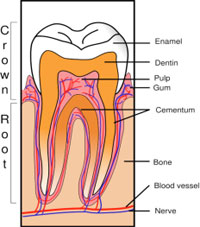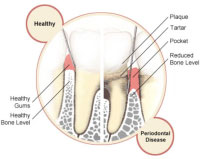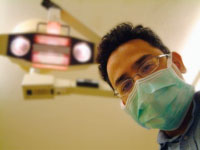Dialysis and Dental Health: What You Need to Know
Keeping a healthy smile when you have kidney failure can take some extra effort. The type of treatment you choose can affect the health of your teeth and gums. In turn, your oral health can have an impact on the rest of your body.
If you were a shark, you could grow a new set of teeth every two weeks! Since we humans can't do that handy trick, we need to take good care of the 32 permanent teeth we have.
Meet Your Teeth
 Teeth contain four types of tissue (See Figure 1):
Teeth contain four types of tissue (See Figure 1):
- The outer part that you can see above your gums is a thin layer of enamel — the hardest tissue in your body—made up of calcium and phosphorus.
- Beneath the gums, bony cementum fixes your teeth into your jawbone.
- Dentin —a hard, yellow mixture of minerals and water—makes up most of your teeth (this is why they may look yellow). Dentin is softer than enamel. If tooth decay breaks through into the dentin, the cavity can get very large.
- The soft pulp in the center of each tooth has blood vessels, nerves, and connective tissue to help hold your teeth in place.
The role of saliva
Would you believe that healthy people make a liter and a half of saliva a day? Mainly water, saliva has enzymes that help digest starch. It helps wash bits of food away from your teeth. It makes your mouth more alkaline, so your teeth are less likely to decay from acid that forms when food breaks down.
Minerals in saliva make tiny repairs to enamel. Saliva moistens food so it's easier to swallow and less likely to scratch your throat. And, it lubricates and protects your tongue and the delicate tissues in your mouth. For all of these reasons, saliva is vital for healthy teeth and gums.
Dialysis and dry mouth
 If you have a strict fluid limit, you may make less saliva. With less saliva to bathe them, your teeth are more prone to decay. Less saliva can also lead to bad breath, gum disease, and tooth loss (see Figure 2). In one study, the average number of teeth in people on dialysis was just 20—a loss of 12. Most transplant programs will require you to have healthy teeth and gums.
If you have a strict fluid limit, you may make less saliva. With less saliva to bathe them, your teeth are more prone to decay. Less saliva can also lead to bad breath, gum disease, and tooth loss (see Figure 2). In one study, the average number of teeth in people on dialysis was just 20—a loss of 12. Most transplant programs will require you to have healthy teeth and gums.
A dry mouth and gum disease can make it harder to eat, too. A study found that people on dialysis who had severe gum disease also had low blood albumin (protein) levels. 1 Not getting enough protein can lead to malnutrition—which is a strong risk factor for death in people on dialysis. 2
Will more dialysis help your mouth? Three studies suggest that it might. In a 2-year study, people who had kidney transplants made more saliva and had less dry mouth than those on standard in-center hemodialysis (HD). 3 In the second study, much more gum disease was found in people on standard HD than in a group on peritoneal dialysis (PD) or a group who did not yet need dialysis. 4 In the third study, people on standard HD had more gum bleeding than those on PD—but both those on PD and HD had more tooth plaque than healthy people. 5 The results suggest that the closer a treatment can bring you to normal kidney function, the healthier your mouth may be, too.
Antibiotics at the dentist
 When you have your teeth cleaned, bacteria in pockets under the gum line may get into your bloodstream. These germs may stick to a dialysis fistula or graft and cause an infection. Some nephrologists prescribe antibiotics before a dental visit to help prevent a problem.
When you have your teeth cleaned, bacteria in pockets under the gum line may get into your bloodstream. These germs may stick to a dialysis fistula or graft and cause an infection. Some nephrologists prescribe antibiotics before a dental visit to help prevent a problem.
There are no controlled studies of whether this practice really does prevent access infections. This doesn't mean it won't work—just that we don't know for sure. Follow your doctor's advice about whether or not to take antibiotics before you have dental work.
For more than 50 years, the American Heart Association (AHA) has had guidelines for use of antibiotics at the dentist. They believed that bacteria from gum disease could reach the heart and lead to heart disease.
 Now, the AHA believes only a very small number of people need antibiotics for this reason.
6
They are those who:
Now, the AHA believes only a very small number of people need antibiotics for this reason.
6
They are those who:
- Have an artificial heart valve
- Have had infectious heart disease
- Were born with heart disease
- Have had a heart transplant and now have a valve problem
What you can do about dry mouth
If dry mouth is a problem for you, the Mayo Clinic suggests some things you can do: 7
-
 If you smoke, chew tobacco, or sleep with your mouth open, these habits can make dry mouth worse. Stopping them can help. Ask your doctor if you need help to quit smoking.
If you smoke, chew tobacco, or sleep with your mouth open, these habits can make dry mouth worse. Stopping them can help. Ask your doctor if you need help to quit smoking.
- Use a humidifier at night to moisten the air while you sleep.
- A number of prescription drugs can have dry mouth as a side effect. Ask your doctor or pharmacist to review your drugs for this. A drug change may help.
- Use sugar-free hard candy or gum to improve saliva flow.
- Avoid sugar: bathing your teeth in it raises your risk of tooth decay. Sticky foods like candy, dried fruit, or potato or corn chips (which stick to teeth once they are chewed) are more likely to cause problems.
- Some products are made to help dry mouth. No-calorie Quench® Mist Mouth Spray 8 comes in cherry, lemon, grape, and orange. Biotene™ has a line of products that include mouthwash, toothpaste, mouth spray, gum, and more. 9
Changing to a longer or more frequent type of dialysis, or getting a transplant, may also help relieve dry mouth.
Preventing and treating tooth decay
 Brushing, flossing, and seeing a dentist for cleanings is key to keeping your teeth healthy. Getting small cavities filled can keep little problems from growing into bigger, costly ones.
Brushing, flossing, and seeing a dentist for cleanings is key to keeping your teeth healthy. Getting small cavities filled can keep little problems from growing into bigger, costly ones.
Are you afraid of the dentist? Many people don't like to go to the dentist, but if fear keeps you from going at all, this can be treated. The Dental Fear Central website has information and even a dental fear support forum.
As with health insurance, many Americans don't have dental coverage. If you need dental work and can't afford it, talk to your social worker about local options:
- Some towns may have free or low cost dental clinics.
- Some dentists may do some free or lo-cost work, or offer a payment plan for costly repairs.
- Special credit cards are on the market to pay for dental or medical bills, even if you don't have a good credit rating.
- Discount cards can help reduce the cost of basic or more extensive dental work.
- If your area has a dental hygiene school, it can be a good source of high-quality, lo-cost dental work. The students are supervised by teachers.
Conclusion
Having a healthy mouth can help you maintain your overall health, and even aid your chance for a transplant. Fight dry mouth and take good care of your teeth and gums to keep on smiling.
References:
- Kshirsagar AV, Craig RG, Beck JD, Moss K, Offenbacher S, Kotanko P, Yoshino M, Levin NW, Yip YK, Almas K, Lupovici E, Falk RJ. Severe periodontitis is associated with low serum albumin among patients on maintenance hemodialysis therapy. Clin J Am Soc Nephrol. 2007 Mar; 2(2):239-44.
- Leon JB, Albert JM, Gilchrist G, Kushner I, Lerner E, Mach S, Majerle A, Porter D, Ricanati E, Sperry L, Sullivan C, Zimmerer J, Sehgal AR. Improving albumin levels among hemodialysis patients: a community-based randomized controlled trial. Am J Kidney Dis. 2006 Jul; 48(1):28-36.
- Bots CP, Brand HS, Poorterman JH, van Amerongen BM, Valentijn-Benz M, Veerman EC, ter Wee PM, Nieuw Amerongen. Oral and salivary changes in patients with end-stage renal disease (ESRD): a two-year follo-up study. Br Dent J. 2007 Jan 27; 202(2):E3.
- Borawski J, Wilczynska-Borawska M, Stokowska W, Mysliwiec M. The periodontal status of pre-dialysis chronic kidney disease and maintenance dialysis patients. Nephrol Dial Transplant. 2007 Feb; 22(2):457-64.
- Bayraktar G, Kurtulus I, Kazancioglu R, Bayramgurler I, Cintan S, Bural C, Bozfakioglu S, Besler M, Trablus S, Issever H, Yildiz A. Evaluation of periodontal parameters in patients undergoing peritoneal dialysis or hemodialysis. Oral Dis. 2008 Mar; 14(2):185-9.
- AHA Guideline: Prevention of Infective Endocarditis
- Mayo Clinic: Dry mouth
- Quench Gum - Nutrition Facts
- Biotene Dry Mouth Products

